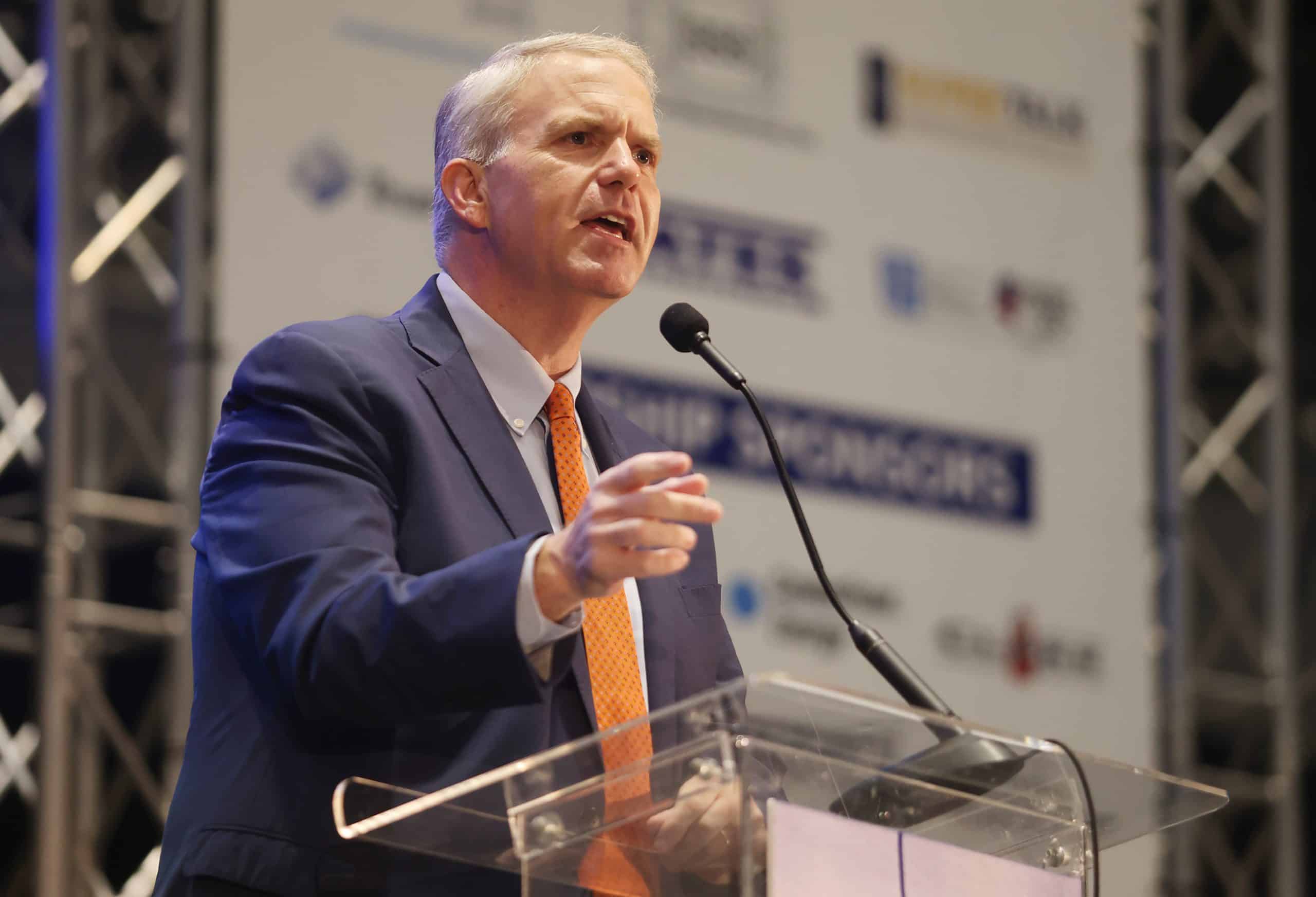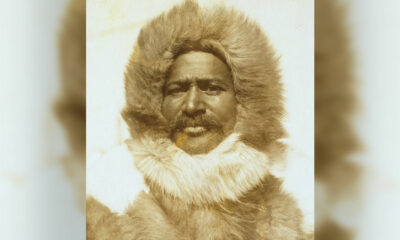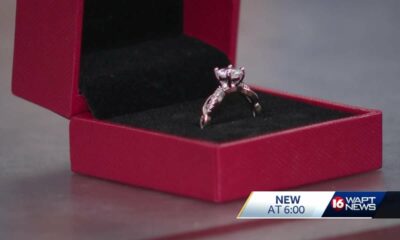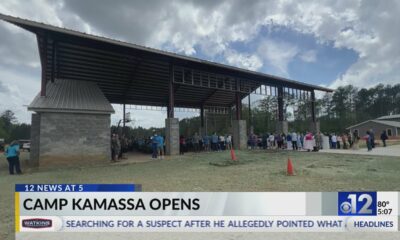Mississippi Today
Several GOP consultants share predictions about runoff between Tate Reeves, Brandon Presley

Welcome to The Homestretch, a daily blog featuring the most comprehensive coverage of the 2023 Mississippi governor’s race. This page, curated by the Mississippi Today politics team, will feature the biggest storylines of the 2023 governor’s race at 7 a.m. every day between now and the Nov. 7 election.
OXFORD — The buzz of the annual “Good Ole Boys and Gals” political event on Thursday wasn’t the stump speeches from high-profile politicians ahead of the Nov. 7 statewide election. It wasn’t the big season Ole Miss football is having, and it wasn’t even the sweet-smelling BBQ chicken.
It was Gov. Tate Reeves’ poll numbers and the growing likelihood of a Nov. 28 gubernatorial runoff between Reeves and his Democratic challenger Brandon Presley.
One consultant at the event who is not affiliated with the Reeves campaign said they had seen a recent internal poll that showed the incumbent governor several points under 50%. A significant portion of voters, the source said, remained undecided or said they will cast votes for Gwendolyn Gray, an independent candidate.
“There have been several polls in the last 10 days that almost guarantee he’ll be in a runoff election,” the consultant, who asked to remain anonymous in order to speak frankly, said. “I would think the Democrats are smelling blood in the water.”
Gray has publicly announced that she is no longer seeking the office and supporting Presley. Her announcement, however, came too late because state officials had already printed ballots, so her presence on the ballot created a runoff probability.
If no candidate on the general election ballot receives more than 50% of the vote, the top two vote-getters will participate in a runoff election on Nov. 28, just five days after Thanksgiving.
Another consultant at the event said they had also reviewed recent polling numbers and doubted if Reeves could garner an outright majority on the first ballot, though they declined to share the specific numbers.
“I’ve crunched the numbers, and anyway you slice it, I’d be preparing for a runoff if I was them,” they said of the Reeves campaign.
A third consultant speculated that while the governor hasn’t hit the 50% mark in some public polls, they don’t believe it will actually translate into a runoff scenario on Election Day. They believe undecided voters will get Reeves over 50%.
With insiders digesting poll numbers, baked beans and coleslaw at the event on Thursday, it was notable that so many attendees were openly speculating about the fact an incumbent Republican governor in a reliably red state may not win on the first ballot.
Reeves, in his speech to the event’s attendees, did not directly mention the runoff possibility, but he appeared to hint at the trouble he’s had reaching 50%. In his stump speech — well, technically a “bench speech” as the candidates at the event stand on an old, wooden bench — he said the only way he could win the general election is “if conservatives show up to the polls.”
“I’m proud of the fact that we’re winning in every poll out there, even in the ones where they fake the outcome,” Reeves said. “But none of those polls matter. The only poll that matters is the one that’s taken on Election Day.”
One person who was noticeably absent was Presley, who currently represents Oxford as north Mississippi’s public service commissioner and has attended the event in previous years. John Morgan, one of the event’s organizers and an Oxford alderman, told attendees that Presley’s campaign initially indicated they would come and participate, but he did not show.
Reeves seized on Presley’s absence at the festival, located in the Democrat’s home turf of north Mississippi and roughly an hour away from his hometown of Nettleton.
“I’m going to be honest with you: I’m not at all surprised that my opponent didn’t have the guts to show up in north Mississippi tonight,” Reeves said. “He’s probably in California or New York meeting with billionaires who are funding his campaign.”
Presley, in a statement to Mississippi Today, did not address his absence but criticized Reeves’ rhetoric.
“Tate Reeves talks real tough and acts real wimpy,” Presley said. “I look forward to cleaning his clock across my home region of North Mississippi on Election Day where I’ve been elected four times.”
Partisan brinkmanship may have been on display between the two candidates for governor, but there were unifying moments on Thursday to mark the death of Johnny Morgan, a former state lawmaker who first organized “Good Ole Boys and Gals” in the mid-1980s.
Morgan, a notable entrepreneur who was a cousin to the Oxford alderman, died in a plane crash in June and was widely viewed as a political powerbroker. House Speaker Philip Gunn, Lt. Gov. Delbert Hosemann, U.S. Sen. Roger Wicker and Reeves all paid tribute to Johnny Morgan in their speeches.
Headlines From The Trail
How a Tate Reeves victory would place him in Mississippi history books
Medicaid’s managed care contracts at a standstill after two companies cry foul
Lt. Gov. Delbert Hosemann calls for free community college tuition
Gubernatorial candidates throw punches from the podium at annual Hobnob forum
Republican operatives sound every alarm on current trajectory of 2023 governor’s race
What We’re Watching
1) A lecture series continues today at Galloway United Methodist Church in downtown Jackson. Galloway, the home church of Gov. Tate Reeves, is hosting faith leaders who will advocate for Medicaid expansion, among other things. Mississippi Today’s Bobby Harrison wrote last month about the series. Here’s how Reeves’ pastor Rev. Cary Stockett framed it: “We want it understood that this is a kingdom of God issue, grossly ignored right in the middle of the Bible Belt. We want the people who quote John 3:16 to understand that it matters to Jesus that there are people (our Mississippi neighbors) without real access to good healthcare … and so it should matter to us, too.”
2) Presley has a busy weekend ahead. On Saturday, he’ll campaign in Ridgeland, Vicksburg, Yazoo City and Pike County. On Sunday, he’ll campaign in Pascagoula, Gulfport and DeSoto County. That’s a lot of ground to cover. We haven’t seen Reeves’ schedule, but it’ll almost certainly be as crowded.
3) Are candidates spending any time in debate prep? The one and only debate of the cycle will be held Wednesday, Nov. 1. It is sure to be a contentious, bitter affair. If you’re in the Jackson metro area, come to Hal & Mal’s for a Mississippi Today watch party. We’ll stream the debate live at 7 p.m. on the big screen, and we’ll host some live analysis as soon as it ends.
This article first appeared on Mississippi Today and is republished here under a Creative Commons license.
Did you miss our previous article…
https://www.biloxinewsevents.com/?p=300473
Mississippi Today
On this day in 1909, Matthew Henson reached the North Pole
April 6, 1909

Matthew Henson reached the North Pole, planting the American flag. Traveling with the Admiral Peary Expedition, Henson reportedly reached the North Pole almost 45 minutes before Peary and the rest of the men.
“As I stood there on top of the world and I thought of the hundreds of men who had lost their lives in the effort to reach it, I felt profoundly grateful that I had the honor of representing my race,” he said.
While some would later dispute whether the expedition had actually reached the North Pole, Henson’s journey seems no less amazing.
Born in Maryland to sharecropping parents who survived attacks by the KKK, he grew up working, becoming a cabin boy and sailing around the world.
After returning, he became a salesman at a clothing store in Washington, D.C., where he waited on a customer named Robert Peary. Pearywas so impressed with Henson and his tales of the sea that he hired him as his personal valet.
Henson joined Peary on a trip to Nicaragua. Impressed with Henson’s seamanship, Peary made Henson his “first man” on the expeditions that followed to the Arctic. When the expedition returned, Peary drew praise from the world while Henson’s contributions were ignored.
Over time, his work came to be recognized. In 1937, he became the first African-American life member of The Explorers Club. Seven years later, he received the Peary Polar Expedition Medal and was received at the White House by President Truman and later President Eisenhower.
“There can be no vision to the (person) the horizon of whose vision is limited by the bounds of self,” he said. “But the great things of the world, the great accomplishments of the world, have been achieved by (people with) … high ideals and … great visions. The path is not easy, the climb is rugged and hard, but the glory at the end is worthwhile.”
Henson died in 1955, and his body was re-interred with full military honors at Arlington National Cemetery. The U.S. Postal Service featured him on a stamp, and the U.S. Navy named a Pathfinder class ship after him. In 2000, the National Geographic Society awarded him the Hubbard Medal.
This article first appeared on Mississippi Today and is republished here under a Creative Commons Attribution-NoDerivatives 4.0 International License.![]()
Mississippi Today
A win for press freedom: Judge dismisses Gov. Phil Bryant’s lawsuit against Mississippi Today
Madison County Circuit Court Judge Bradley Mills dismissed former Gov. Phil Bryant’s defamation lawsuit against Mississippi Today on Friday, ending a nearly two-year case that became a beacon in the fight for American press freedom.
For the past 22 months, we’ve vigorously defended our Pulitzer Prize-winning reporting and our characterizations of Bryant’s role in the Mississippi welfare scandal. We are grateful today that the court, after careful deliberation, dismissed the case.
The reporting speaks for itself. The truth speaks for itself.
This judgment is so much more than vindication for Mississippi Today — it’s a monumental victory for every single Mississippian. Journalism is a public good that all of us deserve and need. Too seldom does our state’s power structure offer taxpayers true government accountability, and Mississippians routinely learn about the actions of their public officials only because of journalism like ours. This reality is precisely why we launched our newsroom nine years ago, and it’s why we devoted so much energy and spent hundreds of thousands of dollars defending ourselves against this lawsuit. It was an existential threat to our organization that took time and resources away from our primary responsibilities — which is often the goal of these kinds of legal actions. But our fight was never just about us; it was about preserving the public’s sacred, constitutional right to critical information that journalists provide, just as our nation’s Founding Fathers intended.
Mississippi Today remains as committed as ever to deep investigative journalism and working to provide government accountability. We will never be afraid to reveal the actions of powerful leaders, even in the face of intimidation or the threat of litigation. And we will always stand up for Mississippians who deserve to know the truth, and our journalists will continue working to catalyze justice for people in this state who are otherwise cheated, overlooked, or ignored.
We appreciate your support, and we are honored to serve you with the high quality, public service journalism you’ve come to expect from Mississippi Today.
READ MORE: Judge Bradley Mills’ order dismissing the case
READ MORE: Mississippi Today’s brief in support of motion to dismiss
This article first appeared on Mississippi Today and is republished here under a Creative Commons Attribution-NoDerivatives 4.0 International License.
Mississippi Today
Meet Willye B. White: A Mississippian we should all celebrate
In an interview years and years ago, the late Willye B. White told me in her warm, soothing Delta voice, “A dream without a plan is just a wish. As a young girl, I had a plan.”
She most definitely did have a plan. And she executed said plan, as we shall see.
And I know what many readers are thinking: “Who the heck was Willye B. White?” That, or: “Willye B. White, where have I heard that name before?”
Well, you might have driven an eight-mile, flat-as-a-pancake stretch of U.S. 49E, between Sidon and Greenwood, and seen the marker that says: “Willye B. White Memorial Highway.” Or you might have visited the Olympic Room at the Mississippi Sports Hall of Fame and seen where White was a five-time participant and two-time medalist in the Summer Olympics as a jumper and a sprinter.
If you don’t know who Willye B. White was, you should. Every Mississippian should. So pour yourself a cup of coffee or a glass of iced tea, follow along and prepare to be inspired.
Willye B. White was born on the last day of 1939 in Money, near Greenwood, and was raised by grandparents. As a child, she picked cotton to help feed her family. When she wasn’t picking cotton, she was running, really fast, and jumping, really high and really long distances.
She began competing in high school track and field meets at the age of 10. At age 11, she scored enough points in a high school meet to win the competition all by herself. At age 16, in 1956, she competed in the Summer Olympics at Melbourne, Australia.
Her plan then was simple. The Olympics, on the other side of the world, would take place in November. “I didn’t know much about the Olympics, but I knew that if I made the team and I went to the Olympics, I wouldn’t have to pick cotton that year. I was all for that.”
Just imagine. You are 16 years old, a high school sophomore, a poor Black girl. You are from Money, Mississippi, and you walk into the stadium at the Melbourne Cricket Grounds to compete before a crowd of more than 100,000 strangers nearly 10,000 miles from your home.
She competed in the long jump. She won the silver medal to become the first-ever American to win a medal in that event. And then she came home to segregated Mississippi, to little or no fanfare. This was the year after Emmett Till, a year younger than White, was brutally murdered just a short distance from where she lived.
“I used to sit in those cotton fields and watch the trains go by,” she once told an interviewer. “I knew they were going to some place different, some place into the hills and out of those cotton fields.”
Her grandfather had fought in France in World War I. “He told me about all the places he saw,” White said. “I always wanted to travel and see the places he talked about.”
Travel, she did. In the late 1950s there were two colleges that offered scholarships to young, Black female track and field athletes. One was Tuskegee in Alabama, the other was Tennessee State in Nashville. White chose Tennessee State, she said, “because it was the farthest away from those cotton fields.”
She was getting started on a track and field career that would take her, by her own count, to 150 different countries across the globe. She was the best female long jumper in the U.S. for two decades. She competed in Olympics in Melbourne, Rome, Tokyo, Mexico City and Munich. She would compete on more than 30 U.S. teams in international events. In 1999, Sports Illustrated named her one of the top 100 female athletes of the 20th century.
Chicago became White’s home for most of adulthood. This was long before Olympic athletes were rich, making millions in endorsements and appearance fees. She needed a job, so she became a nurse. Later on, she became an public health administrator as well as a coach. She created the Willye B. White Foundation to help needy children with health and after school care.
In 1982, at age 42, she returned to Mississippi to be inducted into the Mississippi Sports Hall of Fame and was welcomed back to a reception at the Governor’s Mansion by Gov. William Winter, who introduced her during induction ceremonies. Twenty-six years after she won the silver medal at Melbourne, she called being hosted and celebrated by the governor of her home state “the zenith of her career.”
Willye B. White died of pancreatic cancer in a Chicago hospital in 2007. While working on an obituary/column about her, I talked to the late, great Ralph Boston, the three-time Olympic long jump medalist from Laurel. They were Tennessee State and U.S. Olympic teammates. They shared a healthy respect from one another, and Boston clearly enjoyed talking about White.
At one point, Ralph asked me, “Did you know Willye B. had an even more famous high school classmate.”
No, I said, I did not.
“Ever heard of Morgan Freeman?” Ralph said, laughing.
Of course.
“I was with Morgan one time and I asked him if he ever ran track,” Ralph said, already chuckling about what would come next.
“Morgan said he did not run track in high school because he knew if he ran, he’d have to run against Willye B. White, and Morgan said he didn’t want to lose to a girl.”
This article first appeared on Mississippi Today and is republished here under a Creative Commons Attribution-NoDerivatives 4.0 International License.![]()
-

 Mississippi Today4 days ago
Mississippi Today4 days agoPharmacy benefit manager reform likely dead
-

 News from the South - Kentucky News Feed6 days ago
News from the South - Kentucky News Feed6 days agoTornado practically rips Bullitt County barn in half with man, several animals inside
-

 News from the South - Alabama News Feed5 days ago
News from the South - Alabama News Feed5 days ago'I think everybody's concerned': Mercedes-Benz plant eyeing impact of imported vehicle tariffs
-

 News from the South - Oklahoma News Feed7 days ago
News from the South - Oklahoma News Feed7 days agoLife of David Boren memorialized in ceremony attended by hundreds
-

 News from the South - Missouri News Feed6 days ago
News from the South - Missouri News Feed6 days agoThunderstorms drench areas south of St. Louis
-

 News from the South - Alabama News Feed6 days ago
News from the South - Alabama News Feed6 days ago41st annual Bloomin Festival Arts and Crafts Fair (April 5 & 6) | March 31, 2025 | News 19 at 9 a.m.
-

 News from the South - Florida News Feed4 days ago
News from the South - Florida News Feed4 days agoFlorida special election results: GOP keeps 2 U.S. House seats in Florida
-

 News from the South - Louisiana News Feed5 days ago
News from the South - Louisiana News Feed5 days agoMother turns son's tragedy into mental health mission














































